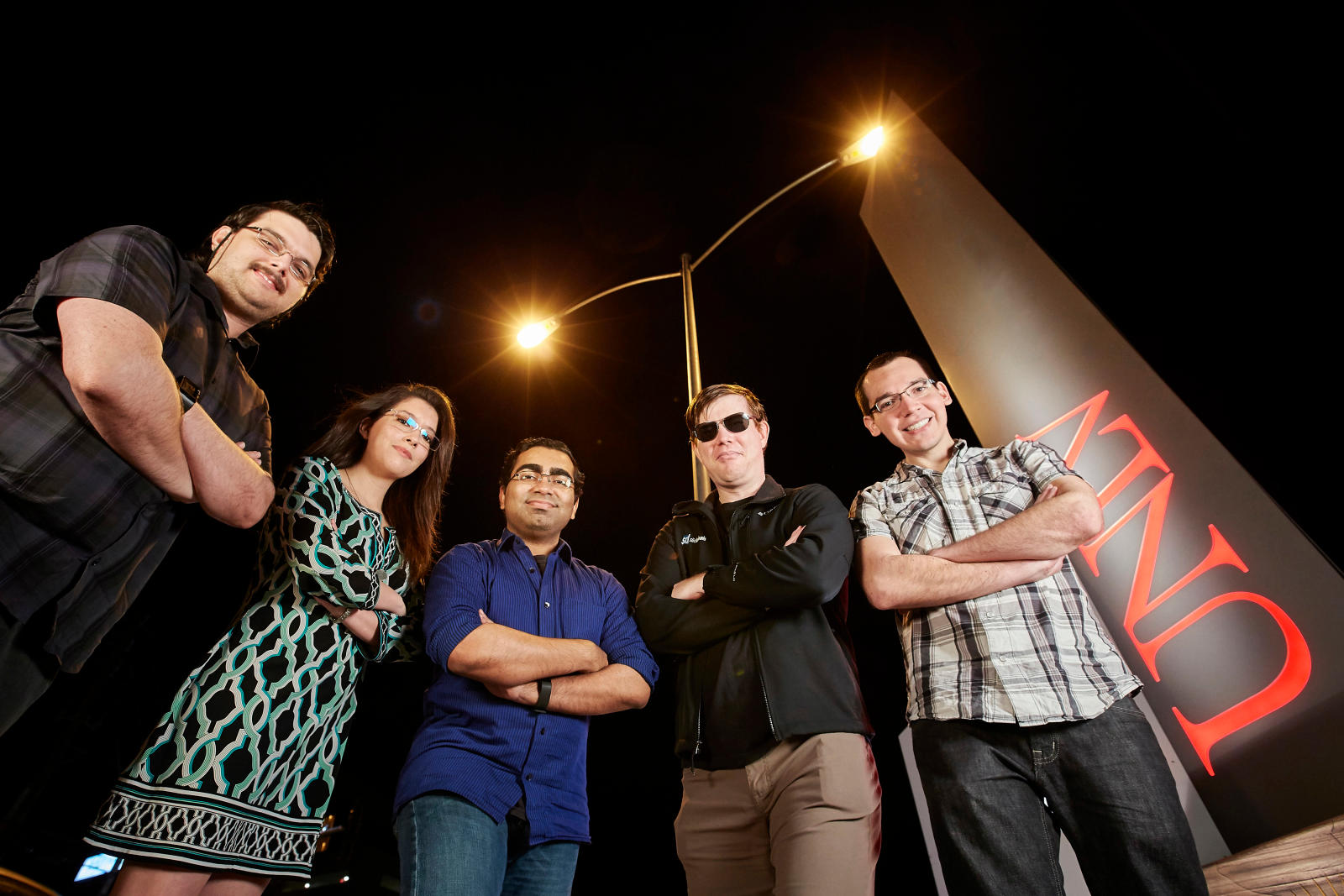During the Smart Cities Hackathon organized by media platform ReadWrite held in conjunction with CES this past January, more than 300 developers and designers from around the globe participated in the competition for a $10,000 grand prize. The goal was to come up with a creative problem-solving solution using only computers, city public data, and new technological devices provided by program sponsors.

Team Wingin' It.
Surprisingly, the winning team was one you wouldn’t expect to be victorious. As their name suggests, Team Wingin’ It, made up of UNLV graduate students Maria Ramos Gonzalez and Ernesto Zamora, computer science/engineering alumni Saju Varghese and Ruben Medina, and their friend Derek Jewell put their heads together to form a solution just days before the event.
Impressively, it took the team just 10 of the allotted 24 hours to create software that can help the city quickly identify streetlight outages that need repair, which is a process currently done manually by a city technician or by relying on resident reports. Now the city of Las Vegas is looking to implement the team’s invention.
Team leader Gonzalez, a Ph.D. student in mechanical engineering, originally declined the invitation to participate as she’s often busy with campus jobs, teaching, volunteering, and keeping up with her robotics-focused YouTube channel, Supershok Labs. As the competition date approached, the buzz among tech and science enthusiasts and a free CES badge was difficult to resist. Gonzalez and Varghese then scrambled to invite three of their friends to meet as a group just a few days before the hackathon.
On game day, the five-member team arrived with a plan: to work on a project related to energy efficiency in a home. The idea was sparked months earlier by an electricity bill that prompted Gonzalez to request and review City of Las Vegas energy records to figure out what had caused her to rack up a $300 charge.
Arriving early, team Wingin’ It collected items from sponsor tables, including the Amazon Tap, a Bluetooth speaker that uses computerized voice system, Alexa. The team also gathered IBM and Honeywell graphical user interface software, Intel devices, and other high-tech devices. Things clicked at the City of Las Vegas’ booth, which offered a staffer armed with open data and ideas about how to use it.
Immediately, Gonzalez and her team began downloading the data and running basic Excel formulas. That's when Gonzalez noticed an anomaly.
“At night, when there should be energy use reported, there was very little or none at all,” said Gonzalez. “In the daytime, when the light should be off, sometimes there would be energy usage. So I realized it might be because of faulty lights.”
The findings were a revelation for the city.
“In order for them to know of an anomaly, someone has to manually sit there and monitor it,” Gonzalez said after receiving an error message while testing the site by submitting a fake report. “Or a regular citizen has to report it by calling or filing a complaint through their online system. But that doesn’t always work.”
Relying on their experience as computer scientists and engineers, the team split up tasks and got to work setting up a server, conducting a visual analysis of data, setting up Alexa using one member’s Amazon account, writing dialogue and commands for computerized voice, and running repeated trials on millions of lines of streetlight data compiled by the city over two years.
Within 10 hours, the team created software that, with the click of a button, would allow a city public works employee, regardless of his or her level of tech savvy, to produce a list of streetlight outages ranked from oldest to most recent. The list includes the meter ID, street name, and outage report date. The employee can also access the information verbally by speaking to Alexa, which can email or read the report aloud.
According to city officials, the invention makes it possible to analyze outages and identify possible problems in near real-time.
“The winning project addresses a fundamental problem the city faces trying to monitor a very large number — 52,000 — of streetlights covering hundreds of miles of city streets,” said Don Jacobson, city of Las Vegas information technology department.
Made for your average user, Team Wingin’ It’s project doesn’t require technical knowledge. According to Gonzalez, technology should be used to better our lives, and everybody from every age to every aspect of knowing or not knowing technology should be able to enjoy it.
“Some people will enjoy using it, some people will enjoy setting it up,” she said. “I feel like technology should be used to better society, not hurt it.”
This goes to show that you never know where the next big idea will come from. Also, it pays to be creative while wingin' it.
Advertisement
Learn more about Electronic Products Magazine





